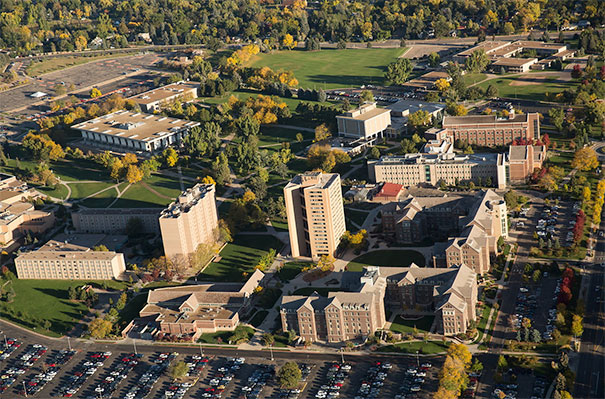
The University of Northern Colorado’s Board of Trustees held its final meeting of fiscal year (FY) 2023 on Friday, June 9. Among several items on a lengthy agenda, the board received an update on phase II of the university’s strategic plan Rowing, Not Drifting 2030, heard a summary report from the Presidential Evaluation Committee regarding a comprehensive review of UNC President Andy Feinstein and approved the university’s FY24 budget.
Strategic Planning
Feinstein kicked off the discussion items with an update on the university’s progress of its strategic plan, Rowing, Not Drifting 2030. The plan, which was implemented in 2020, is in the middle of the second of five phases with current efforts focused on developing robust methods for measuring progress, both within the current two-year phase and toward outcomes identified by 2030.
One new development Feinstein highlighted is the Strategic Plan Progress Report that was launched in February. This public-facing dashboard provides a point-in-time progress report on each of the five key actions identified in the second phase of the plan. Feinstein said the university is on track to wrap up the second phase by June 2024 as progress is either nearing or exceeding the halfway point toward completion on all five actions.
Another key development for the spring is the University Strategic Metrics dashboard presented to trustees during the June 9 meeting. The dashboard was developed in partnership between the Institutional Planning Group and the Office of Institutional Research and Effectiveness. It is designed to track progress on a set of high-level metrics mapped to the strategic plan.
These University Strategic Metrics are organized by the five vision elements, and they will be updated annually as we make progress toward the 2030 outcomes identified in the strategic plan.
Completing the last of this year’s scheduled key action updates to the board, Provost and Executive Vice President for Academic Affairs Kirsty Fleming provided an overview of efforts to date on Key Action 5: Create and implement an academic portfolio management plan.
The motivation behind this work is to develop a process that ensures UNC’s portfolio of academic programs is up to date and relevant while also providing clarity and direction on proactively evaluating current programs.
To that end, the university is revising its approach to program review. The new approach includes refining a process informed by a working group of faculty and staff members that. iscurrently being piloted by several programs. It also includes the development of program dashboards that provide enrollment, retention and graduation data to all academic unit leaders and members of the dean’s offices. These dashboards allow for regular and frequent feedback about the status of each program, which in turn facilitates faster and more strategic decision making at the program level.
Other notable progress on the second phase of the strategic plan so far includes:
- Efforts to complete Key Action 1: Develop and implement a Strategic Enrollment Management Plan (SEM). The purpose of the SEM is to help the university achieve and maintain optimum recruitment, retention and graduation rates. The steering committee charged with leading this process concluded the first phase of the efforts and is now working in subcommittees to develop multiple strategies across enrollment goals.
- Continued commitment to address compensation for faculty and staff in the form of a $1,500 increase that was added to the base salary for all full-time employees in January. This marks the fourth pay increase in less than two years and aligns with Key Action 3: Continue development and implementation of faculty and staff recruitment, engagement and retention plans.
- The implementation of a campus climate survey conducted by the Division of Diversity, Equity and Inclusion. The survey is intended to provide a better understanding of the needs and strengths of the university and results will be shared with the university community in the fall. This work aligns with Key Action 4: Create plans, structures and programs that foster an inclusive environment at UNC where all individuals feel welcomed and supported.
- Ongoing efforts to create a College of Osteopathic Medicine. Recent updates include the creation of a college advisory board, adopting mission, vision and values statements and work toward meeting the standards required by the Commission on Osteopathic College Accreditation (COCA). Over the summer and fall work will continue to secure necessary funding for the project as well as necessary clinical rotations to meet COCA requirements. These efforts align with Key Action 5 and UNC’s desire and commitment to meet the needs and challenges presented by physician shortages across the state and the nation.
Presidential Evaluation Committee
Trustee Annette Martinez and Dana Hoyt, Ph.D., an external consultant with the American Association of State Colleges and Universities (AASCU), provided an executive summary of Feinstein’s first comprehensive review as UNC’s president. The review is routine practice at most universities to provide the president with regular support and feedback on performance.
As part of the comprehensive review process, Hoyt conducted over 125 interviews with a diverse group of faculty, staff, students and community partners. She also administered a survey that was open to the university community from Feb. 20 through March 3, and collected 168 responses.
The survey and interviews evaluated five essential, overlapping clusters of skills: leadership, administration, human relations, entrepreneurship and stewardship. According to Hoyt, there was strong consensus among all stakeholders that Feinstein is strongest in leadership. Across all five clusters he received over 80% excellent to good ratings; indicating that he is perceived as both performing well in all areas and being well balanced across the skill areas.
Of note, some of Feinstein’s strengths were his sense of vision, his ability to build relationships with key external constituents and the fact that he is considered to be approachable and personable. Identified areas of opportunity included a continued focus on enrollment, the potential to further prioritize academic programs and student initiatives and continued work to address compensation for faculty and staff.
Martinez said the survey is one part of the overall evaluation of the president and as part of this effort, the committee has developed an annual process for developing goals, metrics and assessment.
The board charged the Presidential Evaluation Committee last November. In partnership and as requested by Feinstein, the committee, which this year included Martinez and fellow trustees Steve Jordan and Prateek Dutta, worked with the AASCU to formalize a two-part process for a presidential review. The process includes an annual review, as well as a periodic comprehensive review that engages stakeholders with whom the president interacts.
FY24 Budget
During their final meeting of the year, board members also approved the FY24 budget. According to Dale Pratt, vice president of Finance and Administration, UNC will enter FY24 with a balanced budget and a projected beginning cash balance of $71.5 million. The projection includes good news regarding enrollment as the university is expecting 1,400 new first-time undergraduate students, a 17.5% increase over fall 2022 and the first anticipated increase in that population since 2017. Despite the increase in new students, undergraduate enrollment will still show a decline of 2.2% from FY23 due to smaller class sizes of continuing students, a reflection of the decline of new students in previous years. Graduate student enrollment is also expected to be lower by 5.7%.
The FY24 budget includes increases of 6% for undergraduate tuition, 5% for graduate tuition and 5% for student fees. The maximum increase for a full-time, resident undergraduate student will be $625 per year before any financial aid is applied. However, it is expected that the majority of UNC students will see either no out-of-pocket increase or an increase that is a fraction of that total because most receive some financial aid. Additionally, all Pell-eligible students, which includes students with an expected family contribution of up to $6,656 and can include household incomes of up to $72,000, will receive increases in financial aid sufficient to cover the increases in tuition and fees.
Following another year of significant lobbying efforts from higher education leaders in Colorado, including Feinstein, state funding for higher education has been increased by 11.5% overall, or $120 million. UNC’s allocation of the increase amounts to an additional $5.7 million, for a total of $62.7 million in state funding for FY24. The university will also receive $5.9 million from the state in capital funding for controlled maintenance and IT projects.
The FY24 budget also includes the impact of personnel expenses. This includes the annualization of the $1,500 mid-year increases that were added to base salaries in January, as well as a 3% compensation pool recommended to be implemented in July. The increases represent the university’s fourth and fifth increases, respectively, over the past two years, reflecting UNC’s commitment to achieving parity with peer median compensation levels as quickly as possible.
The outcome of these budgetary commitments and assumptions is a projected cash balance at the end of FY24 of $67.1 million, down from the ending balance expected for FY23 of $71.5 million.
In other news, the board:
- Approved delayed bereavement leave and leave with compensation for Feinstein beginning June 12 through Aug. 18. This bereavement leave was postponed to the summer during a time when university operations are less impacted. During his absence, Fleming will serve as the administrator in charge.
- Recognized several outstanding students: Andrew Alirez following his NCAA national wrestling championship last March, outgoing student trustee Christa Harvey for her service to the board during the past academic year and incoming student trustee Jazmin Martinez.
- Reviewed a Program Plan outlining the capital construction project for the proposed College of Medicine.
- Approved the renaming of Michener Library’s Multi-Purpose room to the “Suey Hey and Stella Chin Multi-Purpose Room.” The change recognizes the generosity of UNC alumnus Bob Chin’74, who donated funds in support of the improvement and maintenance of the Library. As part of their strategic plan, the Library prioritized the transformation of learning spaces and environments to ensure they are physically and socially welcoming, accessible and inclusive for UNC students, faculty, staff and community members. The new name honors Bob’s now-deceased parents, Suey Hey and Stella, who he credits as instilling in him the values of hard work and dedication.
- Approved promotion and tenure recommendations for numerous faculty members.
The full agenda and board documentation can always be found on the Board of Trustees website.
— written by Deanna Herbert
More Stories
-
Governor Polis Reappoints Two to UNC’s Board of Trustees
Este artículo no está en español.
-
The Top Stories of 2023
Este artículo no está en español.
-
Key Accomplishments Aligned to Strategic Plan Showcased in December Board Meeting
Este artículo no está en español.
-
Increasing Diversity and Growth in Graduates from Business College Headline Fall Class of 2023
Este artículo no está en español.





